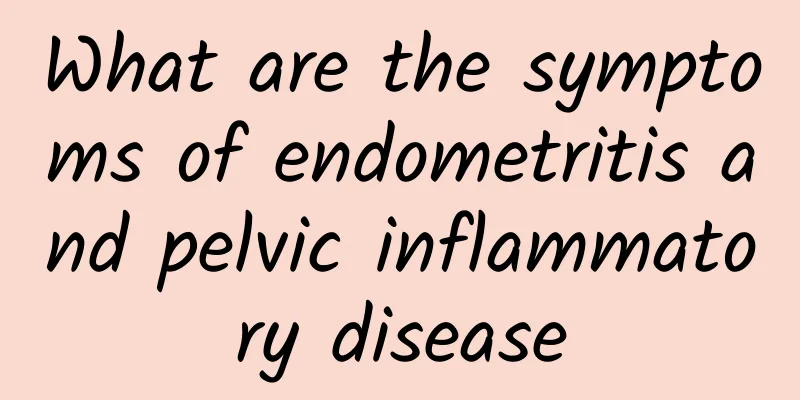What are the symptoms of endometritis and pelvic inflammatory disease

|
If you experience discomfort such as lower abdominal pain, irregular menstruation, or abnormal vaginal discharge, it is recommended that you see a doctor as soon as possible to rule out endometritis or pelvic inflammatory disease. These symptoms may indicate the presence of gynecological inflammation, and early diagnosis and treatment are essential. Endometritis and pelvic inflammatory disease are usually accompanied by different clinical manifestations and need to be distinguished based on specific symptoms. Endometritis is often manifested by lower abdominal pain, fever, irregular menstruation, and pain during sexual intercourse. Pelvic inflammatory disease may cause more severe lower abdominal pain, accompanied by nausea, vomiting, and abnormal vaginal discharge. Low back pain and difficulty urinating may also occur. These symptoms are closely related to the cause. Endometritis is often caused by bacterial infection, such as bacteria that have ascended from the cervix into the uterine cavity. Untreated vaginal or cervical inflammation may also develop into endometritis. Pelvic inflammatory disease is usually caused by untreated sexually transmitted infections such as gonorrhea or chlamydia. If the infection spreads, it may affect the uterus, fallopian tubes, and ovaries, which may worsen symptoms. The structural characteristics of the female reproductive system make it easy for bacteria to spread from the lower part of the reproductive tract to the upper part. These symptoms are closely related to the cause. Endometritis is often caused by bacterial infection, such as bacteria that have ascended from the cervix into the uterine cavity. Untreated vaginal or cervical inflammation may also develop into endometritis. Pelvic inflammatory disease is usually caused by untreated sexually transmitted infections such as gonorrhea or chlamydia. If the infection spreads, it may affect the uterus, fallopian tubes, and ovaries, which may worsen symptoms. The structural characteristics of the female reproductive system make it easy for bacteria to spread from the lower part of the reproductive tract to the upper part. Timely treatment is essential to restore health. Antibiotics are one of the main means of treatment. Doctors may prescribe broad-spectrum antibiotics or drugs for specific strains depending on the severity and type of infection. Intrauterine infection can be quickly relieved by intravenous infusion, and severe patients need to be hospitalized for treatment. Sometimes severe pelvic infections may require surgery to remove damaged tissue. Maintaining good personal hygiene and paying attention to safe sex are important measures to prevent these inflammations. If you have experienced a lower reproductive tract infection, please follow your doctor's advice for regular check-ups and receive appropriate treatment. In terms of diet, consuming more foods rich in vitamin C and B vitamins, such as oranges and spinach, can help enhance immunity. Make sure the body is adequately hydrated to facilitate its own natural healing process. |
<<: Do I need to check for cervical hypertrophy?
>>: What should I eat to replenish my body after a miscarriage in four months of pregnancy
Recommend
Intermittent exercise is super effective in breaking down fatty liver! Sports and fitness coaches teach 4 movements to improve metabolism
People with fatty liver should be careful that it...
The dangers of vaginitis
Vaginitis is a gynecological inflammation that we...
What causes early menopause in women?
Early menopause in women may be caused by a varie...
Can eating brown rice help you lose weight and stay healthy? If you have this physical problem, it is better to eat white rice
With the rise of health awareness in modern times...
Why do you get pelvic inflammatory disease?
Why does pelvic inflammatory disease occur? Pelvi...
What causes cervical erosion? How can cervical erosion be cured?
Cervical erosion refers to the ectopic columnar e...
Let's analyze the causes of irregular menstruation in women
There are more and more women with irregular mens...
Is back pain in early pregnancy a symptom of threatened abortion?
Pregnant women are always suspicious in the early...
What are the treatment principles for uterine fibroids? What are the traditional Chinese medicine treatment methods for uterine fibroids?
When there are too many uterine fibroids or the f...
What are the tests for congenital absence of vagina?
For women, physical health mainly depends on dail...
Causes of bacterial vaginosis
There are many types of bacterial vaginosis, and ...
Treatment of adnexitis
In fact, although adnexitis is only a gynecologic...
Age comparison table of women's menopause
The age comparison table of women's menopause...
Are there any signs of ovarian cysts that can be treated with traditional Chinese medicine?
What are the signs of ovarian cysts? Can Chinese ...
Experts teach women how to avoid dysmenorrhea
Dysmenorrhea is a gynecological disease that ofte...









